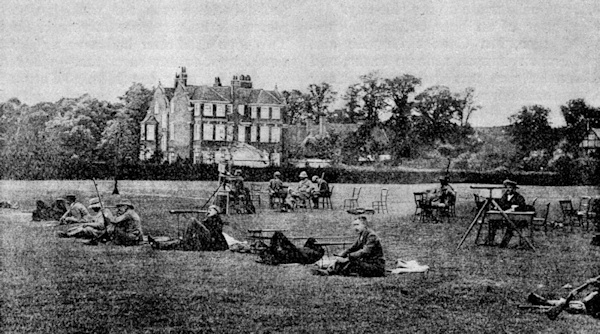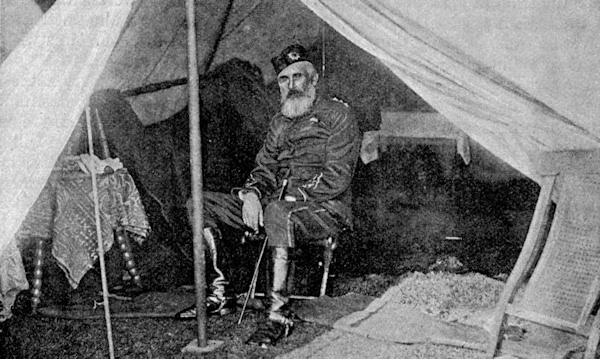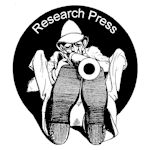Sir Henry St. John Halford, C.B., was born at Maidwell, Northamptonshire, on August 9th, 1828, and curiously enough his family motto is: "To exercise, unambitious of glory, the silent arts." His first lessons were learnt at a dame's school when five years of age, and at seven he was promoted to a grammar school at Market Bosworth, and after a term at a preparatory tutor's, went to Eton at twelve.
"I left Eton in 1845, and went to Merton, Oxford. Out of twenty-eight under-graduates, nineteen of them were Etonians. After taking my degree I travelled a good deal, and was the first with four others to row a four-oared boat on the Rhine, Maine, and Moselle for a distance of 600 miles."
Up to 1860 Sir Henry did nothing but magisterial work in the county - he has been Chairman of the Quarter Sessions for twenty years, and chairman of the County Council for the first four years. When in 1860 the Volunteer movement [8] was started, he was appointed captain of a company formed in Leicestershire. Soon afterwards he was made a major, and finally took command of the Leicestershire Rifle Volunteers in 1862. In those early days the men found their own clothes and rifles. He remained - with a brief lapse of six years - in command until 1891, when he retired; having in 1886 been made a C.B. for his services to Volunteers. It should be mentioned that in 1880 Sir Henry was placed on the Small Arms Committee, and was one of those who had much to do with the selection of the Lee-Metford rifle.
"I was eight years of age when I had my first gun, and went in for rabbit shooting. I was always fond of burning powder, and when rifle shooting came to a head with the Volunteer movement, I got my rifle, went to the Wimbledon meeting of 1861, but found I had not learned enough. In 1862 I got a 'Whitworth,' practised hard all the spring and went to compete in the English Eight at Hythe [9]. I came out first. In the match against Scotland, in that year, for the Elcho Shield. I made top score. It was an exciting match, but ended in England scoring 890 points to Scotland's 724. That year I won £265.

Shooting for the Cambridge Cup
It was in that year that old Captain Ross was very much in evidence at Wimbledon camp, with his three sons - Hercules, Edward and Colin. In 1863 they formed part of the Scottish team. Edward won the first Queen's prize. I knew Ross well. The father and boys had been deer-stalkers all their lives. Ross at this time must have been close upon sixty, and was the finest shots in the world. He was very averse to duelling - pleading that it enabled good shots to insult men with impunity - and told me that he had been appointed second in sixteen duels, and had always got his men apart without allowing a single shot to be fired. So great was he with the use of a pistol that a Spaniard came over specially to study his methods, querying whether Ross was as proficient with the weapon as report avowed. A match was arranged between the two men with duelling pistols - the distance being twenty yards, and the target a bull's-eye the size of a sixpence. The Spaniard hurried off home after seeing Ross hit the bull's-eye with twenty consecutive shots."
"You ask me whom I consider the most representative Irish shot. Rigby, now head of the Small Arms Factory at Enfield. He was a well known Dublin gunmaker and has shot more times in an International team than any man. He shot for the Irish Eight for the Elcho Shield in 1865. Wales really has not got a representative man, for you must remember that the land of the leek never won a big prize until this year, when it captured the Queen's. Wales is particularly deficient in long ranges, and I should say we could not get a representative Welsh team. The Scot's rifle shot, though - in proportion to its population - is the most successful of all. In the final stage of the Queen's at Bisley this year there were 45 Scots, 43 English, 5 Welshmen, 2 each from Jersey, Guernsey and the Cape, and one from Canada.
Sir Henry considers Continental shooting very much behind - they only fire at short range. No foreigners come here who are calculated to frighten, though it is worthy of note that in the very first year at Wimbledon a team of Swiss rifle shots came over, took away some of the best prizes, and were acknowledged superior to the Britishers.
Sir Henry's success in the early sixties as a rifle shot won him immediate recognition. He did not stay to have his powers tested only at the now-departed Wimbledon, but journeyed to the various meetings about the country, particularly distinguishing himself in Northamptonshire, Somersetshire, Inverness, etc.

Sir Henry Halford at Belvoir
Notes
- Sanction for the formation of Volunteer Corps was given by the War Office on 12 May 1859.
- The Hythe School of Musketry was founded in 1853.
